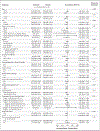Effects of Once-Weekly Exenatide on Cardiovascular Outcomes in Type 2 Diabetes
- PMID: 28910237
- PMCID: PMC9792409
- DOI: 10.1056/NEJMoa1612917
Effects of Once-Weekly Exenatide on Cardiovascular Outcomes in Type 2 Diabetes
Abstract
Background: The cardiovascular effects of adding once-weekly treatment with exenatide to usual care in patients with type 2 diabetes are unknown.
Methods: We randomly assigned patients with type 2 diabetes, with or without previous cardiovascular disease, to receive subcutaneous injections of extended-release exenatide at a dose of 2 mg or matching placebo once weekly. The primary composite outcome was the first occurrence of death from cardiovascular causes, nonfatal myocardial infarction, or nonfatal stroke. The coprimary hypotheses were that exenatide, administered once weekly, would be noninferior to placebo with respect to safety and superior to placebo with respect to efficacy.
Results: In all, 14,752 patients (of whom 10,782 [73.1%] had previous cardiovascular disease) were followed for a median of 3.2 years (interquartile range, 2.2 to 4.4). A primary composite outcome event occurred in 839 of 7356 patients (11.4%; 3.7 events per 100 person-years) in the exenatide group and in 905 of 7396 patients (12.2%; 4.0 events per 100 person-years) in the placebo group (hazard ratio, 0.91; 95% confidence interval [CI], 0.83 to 1.00), with the intention-to-treat analysis indicating that exenatide, administered once weekly, was noninferior to placebo with respect to safety (P<0.001 for noninferiority) but was not superior to placebo with respect to efficacy (P=0.06 for superiority). The rates of death from cardiovascular causes, fatal or nonfatal myocardial infarction, fatal or nonfatal stroke, hospitalization for heart failure, and hospitalization for acute coronary syndrome, and the incidence of acute pancreatitis, pancreatic cancer, medullary thyroid carcinoma, and serious adverse events did not differ significantly between the two groups.
Conclusions: Among patients with type 2 diabetes with or without previous cardiovascular disease, the incidence of major adverse cardiovascular events did not differ significantly between patients who received exenatide and those who received placebo. (Funded by Amylin Pharmaceuticals; EXSCEL ClinicalTrials.gov number, NCT01144338 .).
Figures



Comment in
-
Exenatide did not reduce major cardiovascular outcomes in type 2 diabetes.Ann Intern Med. 2017 Dec 19;167(12):JC67. doi: 10.7326/ACPJC-2017-167-12-067. Ann Intern Med. 2017. PMID: 29255857 No abstract available.
-
Once-Weekly Exenatide and Cardiovascular Outcomes in Type 2 Diabetes.N Engl J Med. 2017 Dec 21;377(25):2502. doi: 10.1056/NEJMc1714163. N Engl J Med. 2017. PMID: 29265780 No abstract available.
-
The role of glucagon-like peptide-1 receptor agonists in cardiovascular disease prevention in type 2 diabetes mellitus: evidence from the most recent clinical trials.Ann Transl Med. 2018 May;6(10):194. doi: 10.21037/atm.2018.03.29. Ann Transl Med. 2018. PMID: 29951516 Free PMC article. No abstract available.
References
-
- Tancredi M, Rosengren A, Svensson A-M, et al. Excess mortality among persons with type 2 diabetes. N Engl J Med 2015;373:1720–32. - PubMed
-
- Centers for Disease Control and Prevention. National diabetes statistics report, 2014. (https://stacks.cdc.gov/view/cdc/23442).
-
- UK Prospective Diabetes Study (UKPDS) Group. Intensive blood-glucose control with sulphonylureas or insulin compared with conventional treatment and risk of complications in patients with type 2 diabetes (UKPDS 33). Lancet 1998;352:837–53. - PubMed
-
- Zoungas S, Arima H, Gerstein HC, et al. Effects of intensive glucose control on microvascular outcomes in patients with type 2 diabetes: a meta-analysis of individual participant data from randomised controlled trials. Lancet Diabetes Endocrinol 2017;5:431–7. - PubMed
Publication types
MeSH terms
Substances
Associated data
Grants and funding
LinkOut - more resources
Full Text Sources
Other Literature Sources
Medical
